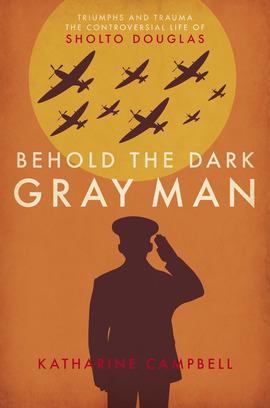As her new book, Behold the Dark Gray Man, is published, Katharine Campbell examines the similarities between today and post-war Germany...
 While the coronavirus has been cutting its merciless path through the world and we have been in lockdown, I have finished my book, Behold the Dark Gray Man, an exploration of the life of my father Sholto Douglas and his long-term struggle with incipient post-traumatic stress disorder (PTSD).
While the coronavirus has been cutting its merciless path through the world and we have been in lockdown, I have finished my book, Behold the Dark Gray Man, an exploration of the life of my father Sholto Douglas and his long-term struggle with incipient post-traumatic stress disorder (PTSD).
Last spring, with the pandemic raging all around us, I was reading and writing about the period in Sholto’s life that caused him the greatest anguish, the heartbreak of which he relived over and over again in his old age: his time as Military Governor of the British Zone of occupied Germany in the aftermath of the Second World War.
I was reminded of the utter chaos that confronted him in war-ravaged Germany: the horrendous loss of life and destitute, starving and cold people, homeless or living in bunkers, cellars and bombed-out buildings, having been stripped of everything. We have lost sight of how appalling it was, and we have also forgotten the magnificent men and women whose deep-seated humanitarian ideals enabled them to resurrect Germany, and indeed Europe, from the ashes, a task in which Sholto played his part but which came at a profound cost to him.
The challenges to mental wellbeing posed by that extreme situation are echoed in those that we face today, and we minimise their significance at our peril. Dr Adrian James, the president of the Royal College of Psychiatrists, has said that the coronavirus crisis poses the greatest threat to mental health since the Second World War, the consequences of which will be felt long after the virus has been brought under control.
And what of those making crucial decisions in the midst of catastrophe? Sholto held the lives of 22 million people in his hands, agonising each day over how to do his best for them. He described himself as having a ‘stern conscience’, and it wasn’t just the remembrance of Germany that troubled him later. The effects of PTSD are cumulative, and when we see people traumatised by a particular situation, we might not realise that they may be carrying hidden vulnerabilities from previous wounds, both mental and physical.
Sholto served in both world wars and had been dealing with death and suffering ever since he was twenty years old. As a young squadron commander in the Royal Flying Corps on the Western Front, not only did he lose his much-loved brother, likewise in the RFC; he also had to send young men out on patrol knowing that some of them would never return, and he often risked death himself. Churchill’s doctor, Lord Moran, was similarly tortured by his decisions as medical officer to the First Battalion Royal Fusiliers from 1914 to 1917. He described his responsibility for certifying his unit as fit as ‘like signing the death warrant of two hundred men. And I might be wrong,’ writing in 1945: ‘Even now after twenty years my conscience is troubled…’
Many years after his experiences in the First World War and his treatment for what we would now call PTSD, the poet Siegfried Sassoon described his continuing struggle with his memories, writing of ‘that garret of uneasy gloom which is your brain’. It is my hope that those who read my book will find in Sholto’s story an acknowledgement and understanding of the nature of trauma and its effects, a first step to healing.
Behold the Dark Gray Man is out now. Order your copy here.
